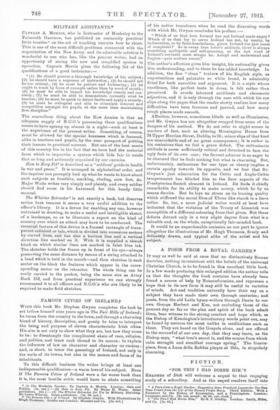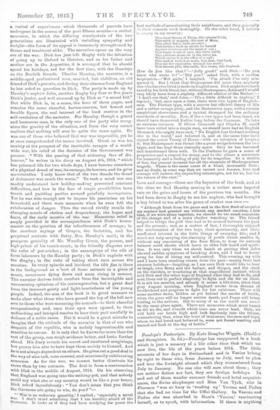FICTION.
"FOR THIS I HAD BORNE
READERS of Dick will welcome a sequel to that engaging study of a schoolboy. And as the sequel resolves itself into • A Posie from a Royal Garden: Suggesting Some Practical Lessons for Onr Owns Tines Brawn from the Life of the Messed Virgin Mary. Third Edition. With a Foreword by the Bishop of Kensington, and a Frontispiece. Loudon: Longman,: and Co. [2a. net, sewed ; Ss. gd. net, cloth.] t "For This T Had Borne Hint." By G. F. Bradby. London: Smith. Elder. and Co. [3s. td.] a recital of experiences which thousands of parents have undergone in the course of the past fifteen months—a recital, moreover, in which the differing standpoints of the two generations are illustrated with unfailing sympathy and insight—the force of its appeal is immensely strengthened by theme and treatment alike. The narrative opens on the very eve of the war. Dick has just left Rugby with the intention of going up to Oxford in October, and as his father and mother are in the Argentine, it is arranged that he should spend his holidays, not for the first time, with the Hawleys on the Norfolk Broads. Charles Hamley, the narrator, is a middle-aged professional man, married, but childless, an old friend of Dick's parents, and during their absence from England he has acted as guardian to Dill. The party is made up by 'Burnley's nephew John, another Rugby boy four or five years Dick's junior, and well summed up by Dick as "a sound kid." But while Dick is, in a sense, the hero of these pages, and remains the same cheerful, harum-scarum, but honest and lovable figure, the real interest of the book centres in the self-revelation of the narrator. For Harnley, though a genial and humorous man, is the only one of the party who recog- nizes the gravity of the situation, and from the very outset realizes that nothing will ever be quite the same again. He was one of those who believed that war was impossible, yet be at once comprehended the issues involved. Great as was his anxiety. at the prospect of the inevitable ravages of a world- wide war, his relief at the decision of the Government was greater. " With the passing of that sickening fear of dis- honour," he writes in his diary on August 4th, 1914, " which has poisoned life for two whole dsye, I have become conscious of a physical dread of war, its carnage, its horrors, and its grim bucertaiuties. I only know that of the two dreads the dread of dishonour was much the worse." To such a mind one can readily understand how holiday-making presented constant difficulties, and how in the face of tragic possibilities lawn tennis and yachting parties seemed painfully incongruous. Yet he was wise enough not to impose his pessimism on his household, and there were moments when he even felt the exhilaration of danger. Thus the record vividly recalls the changing moods of elation and despondency, the hopes and fears, of the early months of the war. Humorous relief is amply provided in the correspondence with Dick's house- master on the question of the infectiousness of mumps ; in the mordant sayings of Grapes, the factotum, and his perpetual contests with Betty, Hrs. Hatnley's maid; in the pompous geniality of Mr. Woodley Green, the parson, and high-priest of his tennis-court; in the friendly disputes over the rules of pot-cricket ; in the assumption of the role of farm labourers by the Hamley party ; in Dick's exploits with the dinghy ; in the risks of taking short cuts across the marshes. In every episode and incident the idle Poe is there in the background as a 'sort of basso ostinato in a piece of music, sometimes dying down and anon rising in menace. The narrator derives little comfort from the incorrigible and unreasoning optimism of his contemporaries, but a great deal from the innocent gaiety and light-heartedness of the young people. Indeed, the aim of the book is in great measure to make clear what those who have passed the top of the !nil now owe to those who were mounting the summit—to their cheerful companionship and, once their eyes were opened, to their unflinching and intrepid resolve to bear their part manfully in defence of a noble cause. But it would be a great mistake to imagine that the attitude of the narrator is that of one who despairs of the republic, who is unduly impressionable and sensitive to omens. It is only that he knows far more than the rest of the group, can weigh evidence better, and looks further ahead. His diary reveals his secret and unuttered misgivings, but proves him also to have kept them mainly to himself. And he is not always dependent on others. He gives out a good deal in the way of wise talk, sane counsel, and occasionally exhilarating nonsense. As for the war, we cannot better illustrate his views than by two extracts. The first is from a conversation with Dick in the middle of August, 1914. On his observing. that England was going into the melting-pot, and that nobody could say what she or any country would be like a year hence, Dick asked incredulously : " You don't mean that you think the GerMans are going to win, do you P "— " ' War is an unknown quantity,' I replied ; ' especially a naval War. I don't mind admitting that I am horribly afraid of the Germans. It looks as if they had been studying for years the
best methods of assassinating their neighbours. and they generally do their research work thoroughly. On the other hand, I believe ill:wisely in my country :
This royal throne of Kings, this scepter'd isle,
This earth of majesty, this seat of Mare, This other Eden, demi-paradise ; This fortress built by nature for boreal' Against infection and the hand of war ; This happy bleed of men, this little world, This precious stone sot in the silver sea. Which serves it in the office of a wall ; 'This laud of such dear souls, this dear, dear land, Dear for her reputation through the world
This blessed plot, this earth, this realm, this England.
How do 31 ou like that?'—' Jolly good said Dick.—' Do you
know who wrote it ? Did you?' asked Dick, with a sudden inspiration.—' Not quite,' I laughed. 'I'm afraid I've only mis- quoted it. But I think that Shakespeare did more than anybody else who has ever lived to makeus Englishmen. Dick might have been saved by his Irish blood, but, without Shakespeare, John and I would very likely have been a slightly different edition of the Roches.'- ' I don't see that,' said John.—' It's a little difficult to explain,' I replied ; ' but, once upon a tune, there wore two types of English- men. The Puritan type, with a narrow but efficient theory of life and a rather savage piety, and the Restoration type, with a certain unspiritual shrewdness and a cynical disregard for the ordinary standards of morality. Now, if the.-o two types had been fused, we should have discovered Kultur long before the Germans. To take an extreme instance. If Oliver Cromwell and Charles II. could have been rolled into a single man, we should have had an English Bismarck who might have said, " We English fear God and uothiug else in the world," and believed it, and at the same time have signed the secret Treaty of Dover—with no intention of keeping it. But Shakespeare was thrust like a great wedge between the two types, and has kept them eternally apart. Only he has leavened and transformed them both. To the Puritans he gave a sense of proportion and a respect for mercy, and to the others a reverence for humanity and a feeling of pity for its tragedies. As a matter, of fact, the present moment has all the elements of Shakespearean tragedy. There is the same sense of a blind, inexorable Fate : and no doubt, in some way that we cannot now foresee, lovo and courage will redeem the impending catastrophe, not for us, but for the tuturo of the race.' " Love and courage—these are the keynotes of the book, and at the close we find Hamley musing in a rather more hopeful vein on the gains and losses of the previous ten months. He
had been down to Rugby to see his nephew, who had brought a boy friend to tea after his game of cricket was over :—
" Although fresh from his game and in the first flush of surprise my nephew had greeted me without any marked emotion, I felt that, if we were alone together, we should be too much oonscious of the obango and of a mute shadow watching us. The friend helped to bridge the gulf that had to be crossed between the past and the present ; and, as a matter of fact, I thoroughly enjoyed the conversation of the two boys, their spontaneity, and their unaffected interest in the little things of everyday life ; and I could not help envying the elasticity of youth which enables it without any coarsening of the finer fibres, to keep its natural balance amid shocks which leave us older folk dazed and spirit- less. It was only when we shook hands at patting that John showed sudden symptoms of breaking down, and I had to hurry away for fear of losing my self-control. This evening, my wife and I have been recalling scenes from the past—mostly from last summer holidays—laughing, as I am sure Dick would like to hear us laugh, over Betty and the ballast, and Grapes, and the slack on the marshes, or wondering at that magnificent instinct which told Dick and the other boys of England what they bad to do, and sent them out in perfect simplicity to fight and die for an ideal. It is not ten months, and already it seems a life-time, since that grey August morning, when England awoke from dreams of brotherhood and progress to fight for her oxistenoo. There will come another dawn, hidden as yet behind the smoke of battle, when the guns will no longer scatter death, and Peace will bring healing to the nations. But to many of us the world can never be the same place again. There are memories which must haunt us till wo die, and wounds which time can never heal. Only, we will hold our heads high and look fearlessly into the future, remembering that, when the hour of trial came, the men and boys, whom we had loved and believed in, were not found wanting and turned not back in the day of battle."







































 Previous page
Previous page